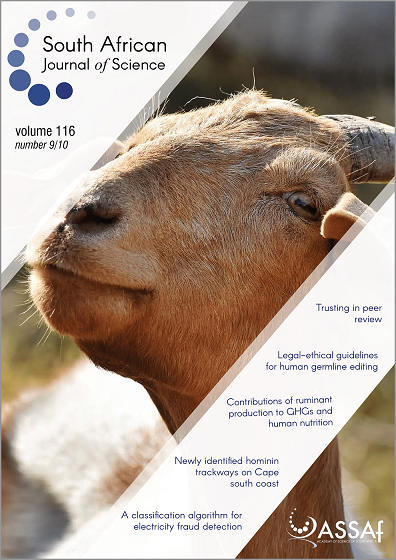A portfolio perspective of rural livelihoods in Bushbuckridge, South Africa
DOI:
https://doi.org/10.17159/sajs.2020/7522Keywords:
land-based income, off-farm cash income, income streams, rural households, sustainable livelihoodsAbstract
Land-based income streams, which include the consumption and selling of crops, livestock and environmental products, are inherent in rural households’ livelihoods. However, the off-farm cash income stream – primarily composed of migrant labour remittances, social grants, and savings and loans – is increasing in importance in many regions. This case study of 590 households from Bushbuckridge, South Africa, analyses the economic value of each of these income streams at three points: what enters the household, what is used and what is sold. Two important findings emerge. First, dependence on offfarm cash incomes is far higher than previously suggested by case studies in the area and the benefits of employment accrue to those already better educated and wealthier. This suggests that shifts in offfarm opportunities will exacerbate already deep inequalities. Second, while environmental products and crops are important for direct use, they generate insignificant cash incomes from sales. This suggests a weakening of the direct links between the local ecosystem and this society, challenging traditional notions of African rurality being intrinsically land based.
Significance:
- Off-farm incomes such as wage labour, remittances and social grants are almost the sole source of cash for households in the study area. Even when including non-monetary incomes such as harvested produce, foraged goods and livestock products, off-farm incomes still represent the overwhelmingly largest proportion of overall household income value. This highlights the fact that South African rural economies are not consistently or primarily land based, and indicates the necessity of rural development strategies that facilitate participation in local cash economies. Otherwise, such efforts will be unable to yield broad benefits and will, instead, simply enrich those who are already better off.
Published
Issue
Section
License

All articles are published under a Creative Commons Attribution 4.0 International Licence
Copyright is retained by the authors. Readers are welcome to reproduce, share and adapt the content without permission provided the source is attributed.
Disclaimer: The publisher and editors accept no responsibility for statements made by the authors
How to Cite
- Abstract 1282
- PDF 1012
- EPUB 222
- XML 364
Funding data
-
Wellcome Trust
Grant numbers 085477/Z/08/Z -
National Institute of Child Health and Human Development
Grant numbers 2P2CHD066613-06 -
National Research Foundation













.png)